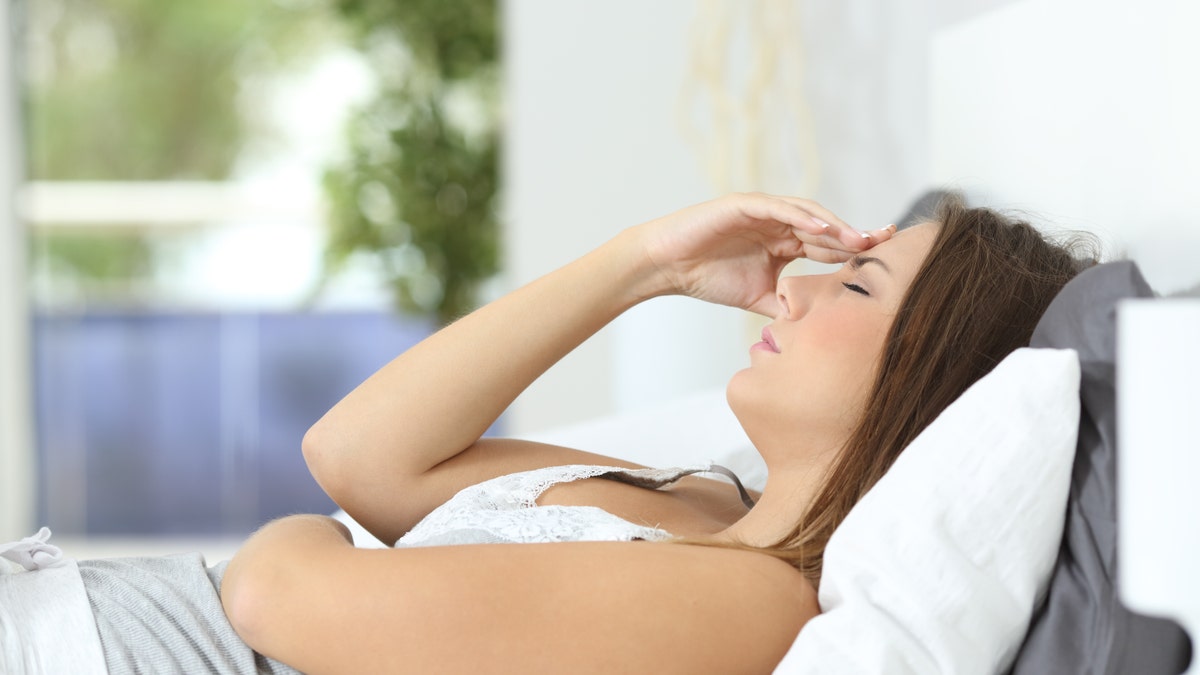
Profile of a woman suffering head ache lying on the bed at home (iStock)
Did you know that there’s a hormone imbalance that may affect as many as 1 in 10 teens and young women? You might think that’s something everyone would be talking about, but the embarrassing symptoms of polycystic ovary syndrome (PCOS) are often ignored or hidden by the young women who experience them. Symptoms typically begin shortly after puberty and include irregular periods, acne, weight gain, and facial hair. Teens with PCOS may not realize that they have a medical condition and can feel embarrassed or isolated.
So what is PCOS? And how is the disorder diagnosed and treated?
Polycystic ovary syndrome is an endocrine disorder. While most of us associate testosterone with men and estrogen with women, there’s actually overlap between the genders. Estrogen plays a small but vital role in male health, and small amounts of “male” hormones like testosterone are typical and healthy in women and girls.
TEEN ACNE TREATMENT: SOLVING THE PIMPLE PROBLEM
Hormones like testosterone belong to a class of hormones called androgens, and these hormones do great things for women – they help build bones and muscles and increase energy levels. They also play an important role in a woman’s sex drive and her ability to enjoy sexual intimacy.
But sometimes a woman’s ovaries or adrenal glands produce excess androgens that can lead to PCOS. No one’s really sure why this happens, but risk factors include a family history of the disorder and diabetes, indicating that genetics and insulin production could play roles in the development of PCOS.
What are the symptoms of PCOS?
The symptoms of PCOS can be troubling for teens and young women unfamiliar with the disorder.
8 GREAT EXERCISES TO KEEP TEENS FIT
Weight gain
About half of young women with PCOS will have trouble maintaining a healthy weight. Extra weight can cause or worsen insulin resistance and throw hormones further out of balance.
Mood swings
The hormone imbalance behind PCOS can cause abnormally difficult mood swings and increase the likelihood of mood disorders like anxiety and depression.
Facial or Body Hair
Noticing more body hair is a normal part of puberty for most girls, but unexplained facial hair or the growth of excess body hair on the belly, hands, or back can be devastating for teens and young women who may feel too embarrassed to take their concerns to a doctor.
Acne
Acne can be a normal part of being or becoming a young adult, and even moderate or severe acne doesn’t always indicate an underlying endocrine disorder. But young women with PCOS are more likely than others to suffer from acne and other skin problems.
Irregular Periods
The excess androgens in women with PCOS can cause heavy bleeding and excessive pelvic pain during menstruation. However, women can experience irregular periods for many reasons, and you should always consult with a doctor if you experience significant changes in your menstrual cycle.
Infertility
For some women, the first symptom they notice is difficulty getting pregnant. PCOS can cause a woman to have menstrual cycles during which she doesn’t ovulate and therefore has no opportunity to conceive.
How is PCOS diagnosed?
If you suspect PCOS and consult with your doctor, you’ve made an important first step toward understanding your symptoms, but the diagnosis may not be quick. Before diagnosing a woman with PCOS, most doctors will want to rule out other possible causes because PCOS isn’t the only cause of menstrual irregularity and increased androgen levels.
Testing usually falls into two categories: blood work to check hormone levels and a physical examination which may include an internal exam or a vaginal ultrasound. If your symptoms, lab work, and exam are consistent with PCOS and no other cause is found, you’ll be diagnosed with PCOS, and your doctor can help you form a treatment plan.
7 CHEAP HOME REMEDIES FOR ACNE
Is PCOS treatable?
The short answer is yes, but some women find treatment more effective than others. The most common treatment is birth control medication. While designed to prevent pregnancy, these medications can also help regulate a woman’s menstrual cycle and reduce androgen levels. Once reproductive hormones are balanced, symptoms like excess hair growth and acne often improve or disappear.
Other important aspects of managing PCOS include a healthy diet, exercise, and weight loss when appropriate. A weight reduction of even 5-10 percent can increase insulin sensitivity and help balance hormones.
In addition to these treatments, surgery is sometimes used to trigger ovulation in women with PCOS who are trying to conceive.
Make sure you find a doctor you feel comfortable with if you’re embarrassed by your symptoms, but always consult with a doctor if you experience any changes in your body that you have questions about.
This article first appeared on AskDrManny.com.







































